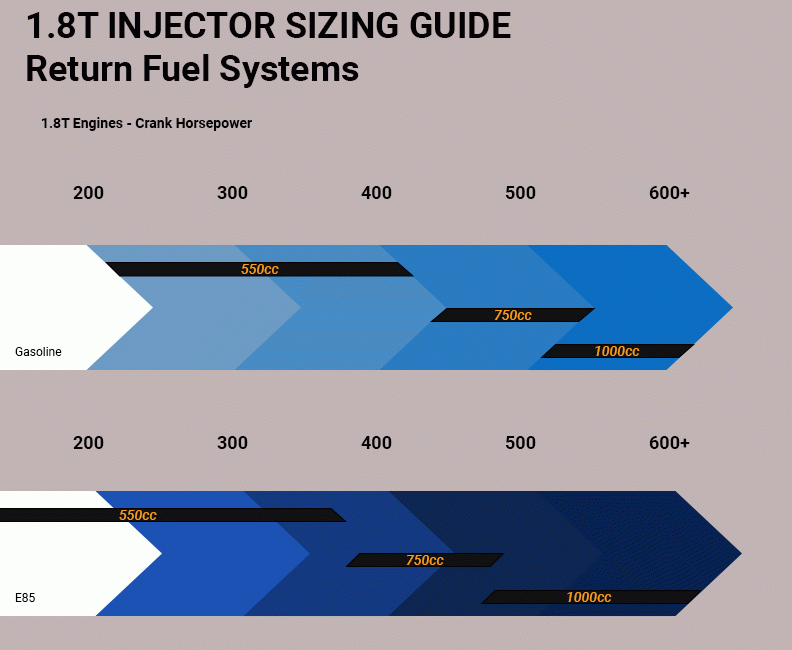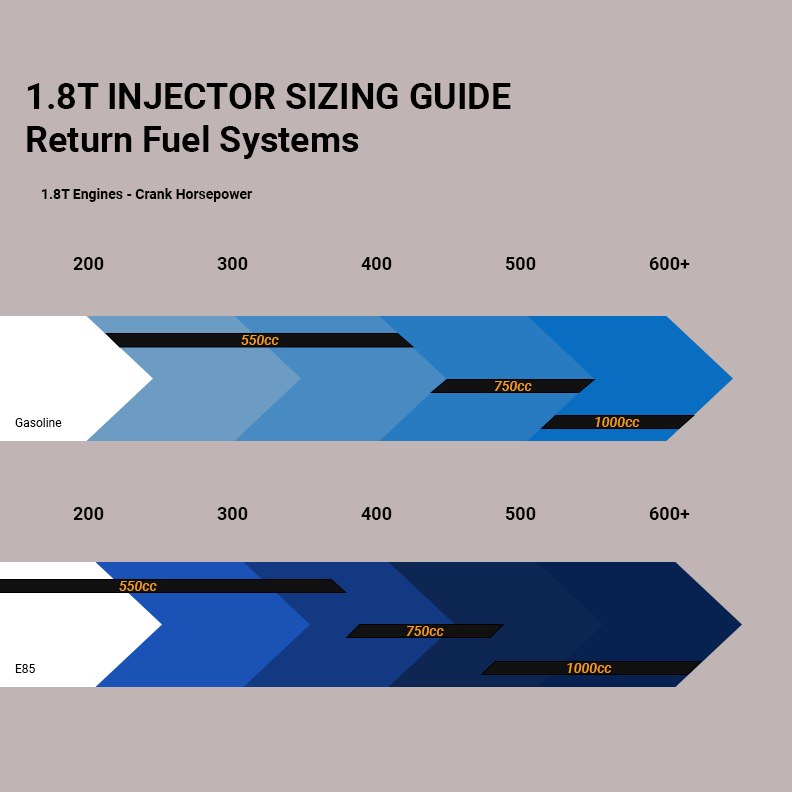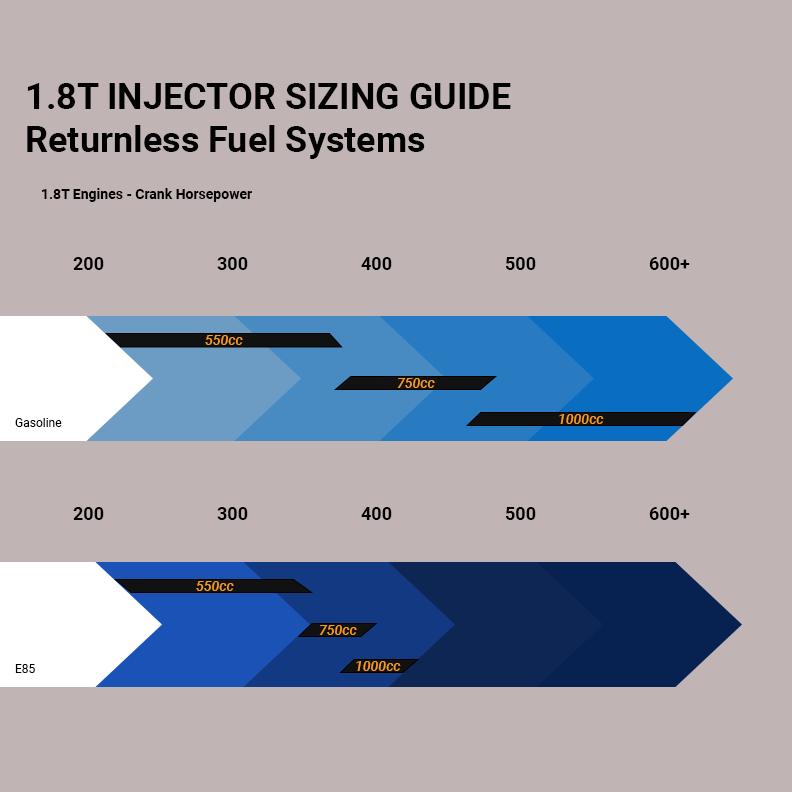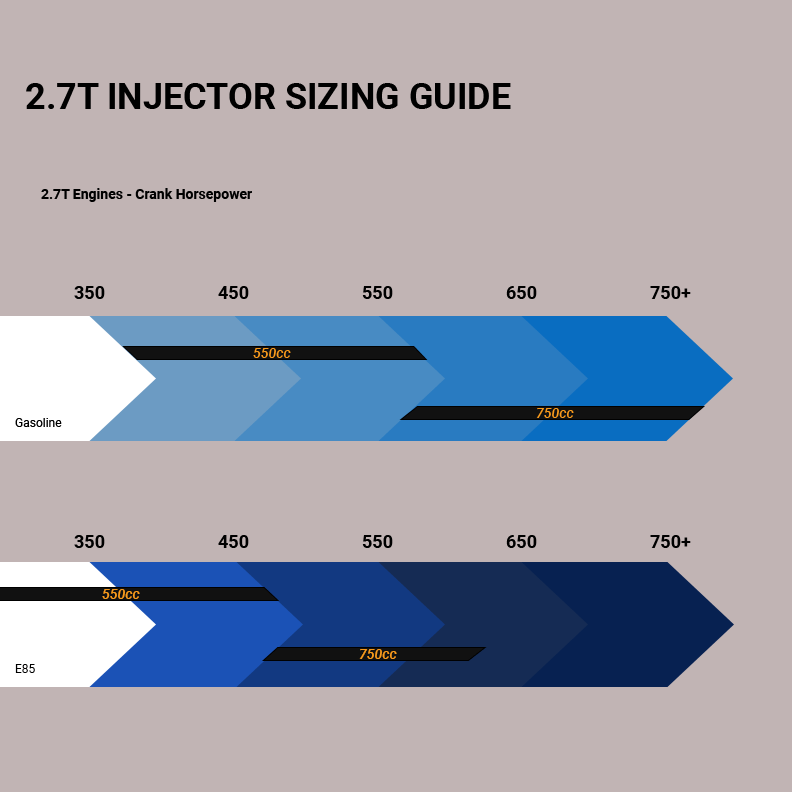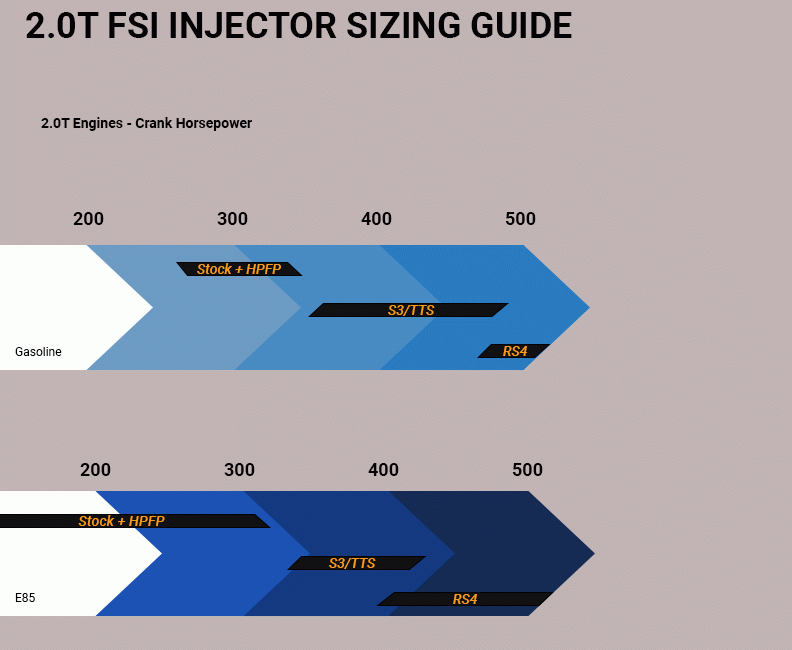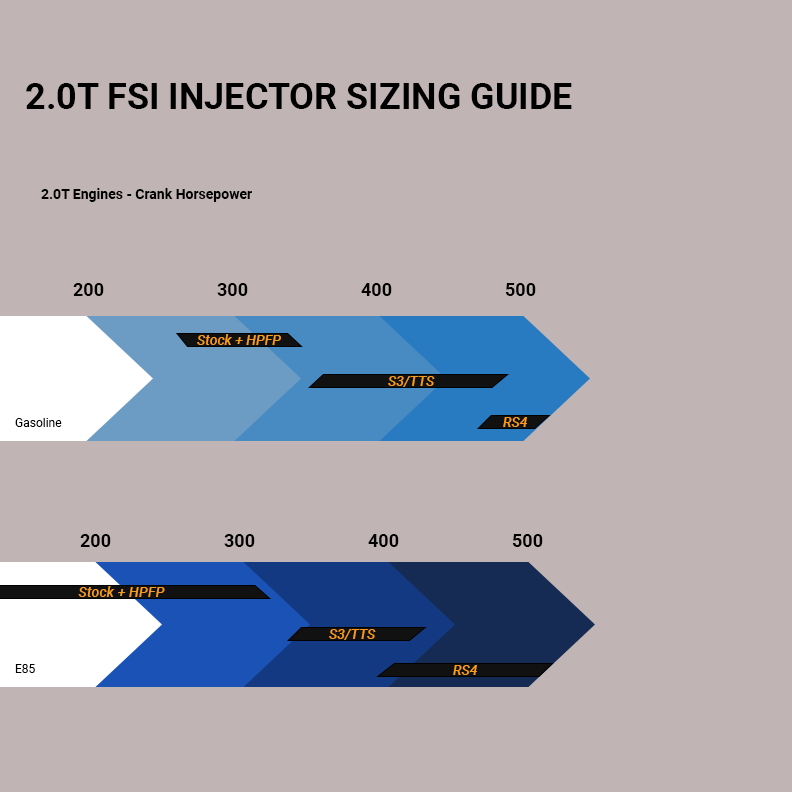Fueling is a critical component in tuning and the right injector is key to optimum performance. Click the images above to assist in finding the correct injector for your project. The images above are intended as a guideline and your build may have different requirements. Please feel free to contact us for additional help with injector selection. The upper ends of the range are possible, but not necessarily advisable with the injector listed. It is absolutely better to have and not need when it comes to injectors.
1.8T Return Fueling
VAG models with return fuel systems include the B5 S4, B5 A4, MK4 GTI & GLI/Jetta, some Passats (2000-2001), and MK1 TT's. The ability to easily alter fuel pressure in return systems means we can do more with less when it comes to injectors.
Pump Gas
Stock Injectors: Up to 240chp (Stage 1)*
550cc Injectors: 200 to 400chp (Stage 1+ through mild big turbo builds)
750cc Injectors: 400 to 500chp (Big Turbo)
1000cc Injectors: 500 to +/-600chp (Big Turbo)
*An upgraded FPR can be used to achieve power gains close to Stage 1+ on vehicles with return fuel set-ups only.
E85
Stock Injectors: Nope
550cc Injectors: Up to 350chp (Stage 1+)
750cc Injectors: 350 to 450chp (Hybrid K04)
1000cc Injectors: 450 to 600chp (Big Turbo)
For all of you out there with AMU block TTs and half megabyte or narrowband ECUs/O2 sensors, start considering a wideband conversion if you'd like to move beyond 550cc. larger injectors are possible, but a massive PITA. The ECUs just aren't quite as capable or high resolution as later models. Besides, it's better to have real time fuel correction past 550ccs.
1.8T Returnless Fueling
The B6 A4 and Passats MY2002 and later rolled off the line with returnless fueling. While ostensibly a good idea from an emissions standpoint, this system has some drawbacks when it comes to performance, static fuel pressure and hotter fuel among them. As such, injector needs increase rapidly and we encourage customers with power goals over 400hp at the crank to strongly consider a return fuel setup, particularly on E85.
You'll notice that the effective window for each injector is narrower than with return fueling. It's one of the reasons we freqently suggest skipping 750cc injectors and moving straight to 1000cc injectors for our B6 A4 and B5 Passat crew.
Pump Gas
Stock Injectors: Up to 215chp (Stage 1)
550cc Injectors: 200 to 350chp (Stage 1+ through simple Big Turbo tunes)
750cc Injectors: 350-450chp (Hybrid K04 with a built bottom end & Big Turbo applications)
1000cc Injectors: 450-500chp (Big Turbo)
E85
Stock Injectors: Nah, not happening.
550cc Injectors: 200 to 320chp (Stage 1+ OEM K04 Turbos)
750cc Injectors: 300 to 350chp (Hybrid K04s)
1000cc Injectors: 350 to 400chp (Hybrid K04s with built bottom end & Big Turbo applications)
And now dear reader, it's time to overhaul your fueling to hit the big numbers.[/vc_column_text][/vc_column][/vc_row][vc_row][vc_column][vc_column_text]
2.7T Engines
Audi's glorious twin turbo setup is fairly straightforward when it comes to injector selection. The 750cc injector shines with E85 and K04/K04 hybrid turbos, the 550cc will handle most anything a stock turbo has to offer and is a solid performer with pump gas. Though as you start getting into the 500chp range, they work a bit too hard for our liking. Taking the next stip up is worth it. Over 600chp, talk to us, the variables start to increase and we're happy to discuss the best options for your build.
Pump Gas
Stock Injectors: Up to 350chp (Stage 1)
550cc Injectors: 350 to 550chp (Stage 1+ & OEM K04 turbos)
750cc Injectors: 550chp plus (Hybrid K04)
1000cc Injectors: Ideal with TTE 650s, TiAL 605s and larger, or for aggressive hybrid turbo builds.
E85
Stock Injectors: Negative (notice a trend yet)?
550cc Injectors: 300 to 450chp (Stage 1+)
750cc Injectors: 450 to 600chp (OEM & Hybrid K04).
We'll talk more about it in a future post, but stay away from the Siemens 630s, kids. On pump gas they aren't so bad for basic builds, but they are typically finicky and settings are all over the place due to their inconsistency and less than ideal flow pattern.
Bosch 630cc have become hard to find in the US, but we are happy to work with them when purchased from Bosch Motorsport, especially for our clients in Australia and Europe.
2.0T FSI Engines
Fueling in FSI land starts to get a bit more complex and the high pressure fuel pump upgrade comes into play before injectors will. Once you make the jump to S3/TTS or RS4 injectors, we strongly suggest upgrading the low pressure fuel pump and adding an RS4 fuel pressure relief valve to maximize performance. The HPFP upgrade is a must for Stage 2 and beyond.
Pump Gas
Stock Injectors: Up to 250chp (Stage 1)
Stock Injectors & HPFP Upgrade: 250 to 330chp (Stage 2)
S3/TTS Injectors: 330 to 450chp (OEM & Hybrid K04)
RS4 Injectors: 450chp and up (Hybrid K04 with built bottom end & Big Turbo)
E85
Stock Injectors: Stop trying to make this a thing.
Stock Injectors & HPFP Upgrade: up to 290chp (Stage 2) Start thinking about a 140bar or higher fuel pressure relief valve as you head into Stage 2+ territory and low pressure controller options.
S3/TTS Injectors: 290 to 375chp (Hybrid K04)
RS4 Injectors: 375chp and up (Big Turbo)
E85 is not the ideal fuel type for 2.0T FSI EA113 engines with upgraded turbos. Blends are often more effective due to the extra short injection window. As you get into larger turbos, low pressure pump control needs increase and the cost benefit analysis starts pushing many people to water methanol as an alternative.

